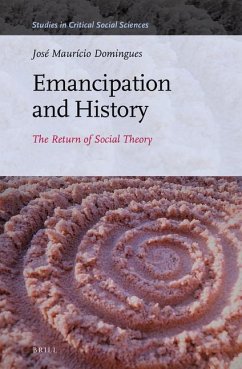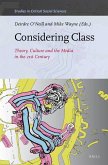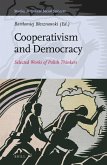- Gebundenes Buch
- Merkliste
- Auf die Merkliste
- Bewerten Bewerten
- Teilen
- Produkt teilen
- Produkterinnerung
- Produkterinnerung
Assessing critical theory today, this book focuses on the connection between history and emancipation, centering on trends that structure modernity and may lead us beyond it. To achieve its goal, it returns to abandoned issues in social and sociological theory.
Andere Kunden interessierten sich auch für
![Considering Class: Theory, Culture and the Media in the 21st Century Considering Class: Theory, Culture and the Media in the 21st Century]() Considering Class: Theory, Culture and the Media in the 21st Century180,99 €
Considering Class: Theory, Culture and the Media in the 21st Century180,99 €![Interrogating the Future Interrogating the Future]() Interrogating the Future201,99 €
Interrogating the Future201,99 €![Beyond Marx and Other Entries Beyond Marx and Other Entries]() David GleicherBeyond Marx and Other Entries143,99 €
David GleicherBeyond Marx and Other Entries143,99 €![Subsumption in Kant, Hegel and Marx Subsumption in Kant, Hegel and Marx]() Andres Saenz de SiciliaSubsumption in Kant, Hegel and Marx142,99 €
Andres Saenz de SiciliaSubsumption in Kant, Hegel and Marx142,99 €![Cooperativism and Democracy Cooperativism and Democracy]() Cooperativism and Democracy159,99 €
Cooperativism and Democracy159,99 €![Global Marx Global Marx]() Global Marx154,99 €
Global Marx154,99 €![The Economies of Violence The Economies of Violence]() The Economies of Violence176,99 €
The Economies of Violence176,99 €-
-
-
Assessing critical theory today, this book focuses on the connection between history and emancipation, centering on trends that structure modernity and may lead us beyond it. To achieve its goal, it returns to abandoned issues in social and sociological theory.
Hinweis: Dieser Artikel kann nur an eine deutsche Lieferadresse ausgeliefert werden.
Hinweis: Dieser Artikel kann nur an eine deutsche Lieferadresse ausgeliefert werden.
Produktdetails
- Produktdetails
- Verlag: Brill
- Seitenzahl: 196
- Erscheinungstermin: 21. September 2017
- Englisch
- Abmessung: 236mm x 155mm x 18mm
- Gewicht: 399g
- ISBN-13: 9789004348752
- ISBN-10: 9004348751
- Artikelnr.: 48513516
- Herstellerkennzeichnung
- Libri GmbH
- Europaallee 1
- 36244 Bad Hersfeld
- gpsr@libri.de
- Verlag: Brill
- Seitenzahl: 196
- Erscheinungstermin: 21. September 2017
- Englisch
- Abmessung: 236mm x 155mm x 18mm
- Gewicht: 399g
- ISBN-13: 9789004348752
- ISBN-10: 9004348751
- Artikelnr.: 48513516
- Herstellerkennzeichnung
- Libri GmbH
- Europaallee 1
- 36244 Bad Hersfeld
- gpsr@libri.de
José Maurício Domingues, PhD in sociology (LSE), professor at IESP-UERJ, Brazil, author of Global Modernity, Development, and Global Civilization (Routledge, 2012), Latin America and Contemporary Modernity (Routledge, 2018), Modernity Reconstructed (University of Wales Press, 2006), Social Creativity, Collective Subjectivity and Contemporary Modernity (Macmillan/Saint Martin's Press, 2000) and Sociological Theory and Collective Subjectivity (MacMillan/Saint Martin's Press, 1995).
List of Illustrations
Introduction
1 Vicissitudes and Possibilities of Critical Theory Today
Defining Critical Theory
Contemporary Modernity
Renewing Critique
2 Global Modernity: Levels of Analysis and Conceptual Strategies
Introduction
Levels of Analysis
Descriptions
Middle-range Analytical Concepts
General Analytical Concepts
A Trend-concept: Secularization
Conclusion
3 Existential Social Questions, Developmental Trends and Modernity
The Problem
Existential Social Questions
Existential Questions, Developmental Trends and Modernizing Moves
Final Words
4 History, Sociology and Modernity
Introduction
Historical Sociology and Sociological Theory
Theory and Mechanisms
Conclusion
5 Realism, Trend-concepts and the Modern State
Introduction
Beyond Empiricism (and Critical Realism)
The Modern State and Modern Society
Collective Subjectivity, Mechanisms, Modernization
Final Words
6 Family, Modernization and Sociological Theory
Two Intertwined Themes
Globalization and Modernization
The Family, the “dimensions” of Social Life and the “existential
questions”
Conclusion
7 The Basic Forms of Social Interaction
Introduction
Principles of Organization, Mechanisms of Coordination
Principles of Antagonism, Mechanisms of Opposition
Coordination, Antagonism
Interactive Inclinations
Bases of Justification
Conclusion
8 The Imaginary and Politics in Modernity: The Trajectory of Peronism
Introduction
Theoretical Background
Historical Peronism
The Argentina of Kirchner and Fernández de Kirchner
The Imaginary and Politics in Modernity
9 Critical Social Theory and Developmental Trends, Emancipation and Late
Communism
Introduction
Capitalism, Accumulation and Communism
Contemporary Alternatives
Tasks of Critical Theory – or Late Twentieth Century Communism
References
Index
Introduction
1 Vicissitudes and Possibilities of Critical Theory Today
Defining Critical Theory
Contemporary Modernity
Renewing Critique
2 Global Modernity: Levels of Analysis and Conceptual Strategies
Introduction
Levels of Analysis
Descriptions
Middle-range Analytical Concepts
General Analytical Concepts
A Trend-concept: Secularization
Conclusion
3 Existential Social Questions, Developmental Trends and Modernity
The Problem
Existential Social Questions
Existential Questions, Developmental Trends and Modernizing Moves
Final Words
4 History, Sociology and Modernity
Introduction
Historical Sociology and Sociological Theory
Theory and Mechanisms
Conclusion
5 Realism, Trend-concepts and the Modern State
Introduction
Beyond Empiricism (and Critical Realism)
The Modern State and Modern Society
Collective Subjectivity, Mechanisms, Modernization
Final Words
6 Family, Modernization and Sociological Theory
Two Intertwined Themes
Globalization and Modernization
The Family, the “dimensions” of Social Life and the “existential
questions”
Conclusion
7 The Basic Forms of Social Interaction
Introduction
Principles of Organization, Mechanisms of Coordination
Principles of Antagonism, Mechanisms of Opposition
Coordination, Antagonism
Interactive Inclinations
Bases of Justification
Conclusion
8 The Imaginary and Politics in Modernity: The Trajectory of Peronism
Introduction
Theoretical Background
Historical Peronism
The Argentina of Kirchner and Fernández de Kirchner
The Imaginary and Politics in Modernity
9 Critical Social Theory and Developmental Trends, Emancipation and Late
Communism
Introduction
Capitalism, Accumulation and Communism
Contemporary Alternatives
Tasks of Critical Theory – or Late Twentieth Century Communism
References
Index
List of Illustrations
Introduction
1 Vicissitudes and Possibilities of Critical Theory Today
Defining Critical Theory
Contemporary Modernity
Renewing Critique
2 Global Modernity: Levels of Analysis and Conceptual Strategies
Introduction
Levels of Analysis
Descriptions
Middle-range Analytical Concepts
General Analytical Concepts
A Trend-concept: Secularization
Conclusion
3 Existential Social Questions, Developmental Trends and Modernity
The Problem
Existential Social Questions
Existential Questions, Developmental Trends and Modernizing Moves
Final Words
4 History, Sociology and Modernity
Introduction
Historical Sociology and Sociological Theory
Theory and Mechanisms
Conclusion
5 Realism, Trend-concepts and the Modern State
Introduction
Beyond Empiricism (and Critical Realism)
The Modern State and Modern Society
Collective Subjectivity, Mechanisms, Modernization
Final Words
6 Family, Modernization and Sociological Theory
Two Intertwined Themes
Globalization and Modernization
The Family, the “dimensions” of Social Life and the “existential
questions”
Conclusion
7 The Basic Forms of Social Interaction
Introduction
Principles of Organization, Mechanisms of Coordination
Principles of Antagonism, Mechanisms of Opposition
Coordination, Antagonism
Interactive Inclinations
Bases of Justification
Conclusion
8 The Imaginary and Politics in Modernity: The Trajectory of Peronism
Introduction
Theoretical Background
Historical Peronism
The Argentina of Kirchner and Fernández de Kirchner
The Imaginary and Politics in Modernity
9 Critical Social Theory and Developmental Trends, Emancipation and Late
Communism
Introduction
Capitalism, Accumulation and Communism
Contemporary Alternatives
Tasks of Critical Theory – or Late Twentieth Century Communism
References
Index
Introduction
1 Vicissitudes and Possibilities of Critical Theory Today
Defining Critical Theory
Contemporary Modernity
Renewing Critique
2 Global Modernity: Levels of Analysis and Conceptual Strategies
Introduction
Levels of Analysis
Descriptions
Middle-range Analytical Concepts
General Analytical Concepts
A Trend-concept: Secularization
Conclusion
3 Existential Social Questions, Developmental Trends and Modernity
The Problem
Existential Social Questions
Existential Questions, Developmental Trends and Modernizing Moves
Final Words
4 History, Sociology and Modernity
Introduction
Historical Sociology and Sociological Theory
Theory and Mechanisms
Conclusion
5 Realism, Trend-concepts and the Modern State
Introduction
Beyond Empiricism (and Critical Realism)
The Modern State and Modern Society
Collective Subjectivity, Mechanisms, Modernization
Final Words
6 Family, Modernization and Sociological Theory
Two Intertwined Themes
Globalization and Modernization
The Family, the “dimensions” of Social Life and the “existential
questions”
Conclusion
7 The Basic Forms of Social Interaction
Introduction
Principles of Organization, Mechanisms of Coordination
Principles of Antagonism, Mechanisms of Opposition
Coordination, Antagonism
Interactive Inclinations
Bases of Justification
Conclusion
8 The Imaginary and Politics in Modernity: The Trajectory of Peronism
Introduction
Theoretical Background
Historical Peronism
The Argentina of Kirchner and Fernández de Kirchner
The Imaginary and Politics in Modernity
9 Critical Social Theory and Developmental Trends, Emancipation and Late
Communism
Introduction
Capitalism, Accumulation and Communism
Contemporary Alternatives
Tasks of Critical Theory – or Late Twentieth Century Communism
References
Index








